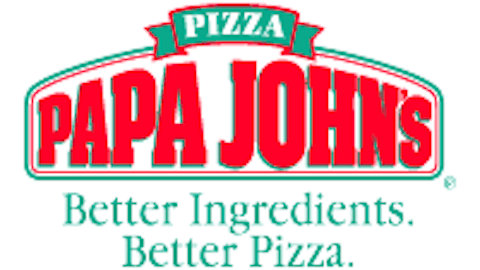
Sure, Yum! Brands, Inc. (NYSE:YUM) has had a lot of support from investors and analysts lately. We’ve seen increasing earnings outlooks, despite economic slowdown and bad publicity in China. Sure enough, things got worse, just like Yum! predicted.
Earnings came in at $0.56 per share for the fast-food holdings company, 16% lower from the second quarter last year. And while these numbers aren’t as dismal as the ones from the first quarter, they still aren’t great. Nothing changes the fact that Yum! Brands, Inc. (NYSE:YUM) is still relying heavily on China as their main source of growth and there are better hedged and cheaper companies out there worth looking into.
I’m not saying China is going to collapse. But if there is in fact an economic slowdown, or we have another avian flu scare, Yum! Brands, Inc. (NYSE:YUM) will find itself between a rock and a hard place once again.
Reliance on China
China, the second largest economy in the world, is currently going a lifestyle change that is becoming more and more ‘Western’ every day. The country’s fast food industry is expected to grow 14% in 2013 alone.
Other companies, including McDonald’s Corporation (NYSE:MCD) and Starbucks, are expanding rapidly there as well. A large portion of Yum!’s operations are coming from China, as well as most of their growth. Its staple in the country is KFC, which has proven to be a huge hit in the area for some reason. And while the company has solid growth in other Asian countries, Yum! seems to really be banking on a huge expansion in China.
There’s always next year
Yum! Brands, Inc. (NYSE:YUM) vows that earnings will pickup in 2014. And sure, it might. But does it make the company investment worthy? Not compared to other companies with the same Asian expansion strategy.
The current price to earnings growth ratio for Yum! Brands is 2.23. Compared to other companies with a strong presence in China, this ratio is very high.
Take McDonald’s Corporation (NYSE:MCD), the largest fast food corporation in China. Its price to earnings growth ratio is only 1.87, which prices the firm’s growth much cheaper than Yum! Brands. McDonald’s Corporation (NYSE:MCD) is also expanding their McCafe outlets 45% this year alone, in addition to its better-known McDonald’s operations. And while also reliant on China, McDonald’s has a much different geographical layout.
Like Yum! Brands, McDonald’s has all but saturated America with fast food chains. The difference is that it’s not only looking to Asia for increased revenue and growth. 40% of McDonald’s Corporation (NYSE:MCD) sales come from Europe, whereas 22% comes from the AMEA region. Compared to Yum!’s sales in the European region, which are nearly nonexistent, McDonald’s is much better off in the event that European economics take a turn for the better or Chinese growth happens to slow down
Yum! Brands, Inc. (NYSE:YUM) may have slightly more upside that McDonald’s Corporation (NYSE:MCD), but it also may have more downside.
Which one is priced better?
There’s been a lot of hype about Yum!’s growth, whereas the king of fast food, McDonald’s, has been comparatively ignored.
Yum! Brands currently boasts a price to earnings ratio of 23 for the trailing twelve months, versus 18.5 for McDonald’s. It’s worth nothing that both of these are much lower than the competitor average (in the mid 20s), but McDonald’s Corporation (NYSE:MCD) still wins out significantly.
But which company has cheaper growth?
According to Yum!’s 2012 annual report, the company predicted that earnings would shrink by 6.2% in 2013, and then have a monster 22.55% growth in the following year. And so far, it’s pretty much played out that way. The shrinking part, anyways.
Sounds great, right?
Yes, but not as great as you might think. When you run the math, Yum! Brands, Inc. (NYSE:YUM)’s earnings per share will have increased 16.3% from 2012 to the end of 2014. Not a bad number by any means.
But compare it to McDonald’s Corporation (NYSE:MCD) earnings growth for 2013 and 2014. McDonald’s expects to grow earnings 6.37% for 2013, and then 9.63% for 2014. While they appear to be solid numbers, the growth still seems less impressive than Yum!’s.
But after running the numbers again, the total EPS growth for McDonald’s comes out to be 16.64%, beating Yum!’s growth by a noticeable margin. Not to mention that more earnings growth is already priced into Yum! (remember the PEG ratios). So, by investing in Yum!, you’re getting less earnings growth for a higher premium, with a company that is betting more on a riskier market.
Doesn’t sound so great when you put it that way.
You’re not bad. You’re just not great.
Yum! Brands, Inc. (NYSE:YUM) isn’t a bad company by any means. But when presented with multiple investment options, why not go for the slightly less popular and better priced alternative – especially when McDonald’s is a more established company with less risk on the table? McDonald’s carries a beta of only 0.35, which makes it much less volatile than Yum!, which has a beta of 0.80.
McDonald’s has more widespread opportunities in diverse geographical areas, and still brings in a better value than Yum! Brands. In the end, the differences discuss here have very marginal effects on which investment you might choose. But sometimes these marginal differences add up, and it can only take 1% to separate a good business from a great one.
The article You Ate the Bones… originally appeared on Fool.com and is written by Ryan Gilbert.
Ryan Gilbert has no position in any stocks mentioned. The Motley Fool recommends McDonald’s. The Motley Fool owns shares of McDonald’s. Ryan is a member of The Motley Fool Blog Network — entries represent the personal opinion of the blogger and are not formally edited.
Copyright © 1995 – 2013 The Motley Fool, LLC. All rights reserved. The Motley Fool has a disclosure policy.




